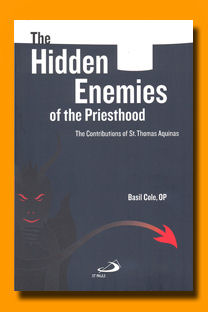
|
Posted April 24, 2007
Book: The Hidden Enemies of the Priesthood: The Contributions of St. Thomas Aquinas Author: Basil Cole, OP St. Pauls. New York. 2007. Pp. 234 An Excerpt from the Jacket:
An Excerpt from the Book: Material Goods and the Spirit of Poverty Material things are goods necessary for living the good life of virtue. If people are sick, hungry or cold, virtue becomes very difficult, though not impossible by special graces from God, given man’s fallen nature. Like the emotions, the possession and use of material things can get out of hand. Instead of utilizing them for the glory of God, the human person can become the slave to things, thinking that the more he has the better a person he will become. In many ways, the social teaching of the Church is about curing this problem of wanting to possess things for their own sakes. Even the vow of poverty professed by religious is a frontal assault on avarice. The diocesan priest does not make a vow of poverty, but he like all the Christian faithful is called to live the spirit of poverty. As the Catechism so well expresses it: 2544. Jesus enjoins his disciples to prefer him to everything and everyone, and bids them “renounce all that [they have]” for his sake and that of the Gospel. Shortly before his passion he gave them the example of the poor widow of Jerusalem who, out of her poverty, gave all that she had to live on. The precept of detachment from riches is obligatory for entrance into the Kingdom of heaven. 2545. All Christ’s faithful are to “direct their affections rightly, lest they be hindered in their pursuit of perfect charity by the use of worldly things and by an adherence to riches which is contrary to the spirit of evangelical poverty.” . . . Throughout Summa Theologicae II-II 118, Thomas Aquinas shows us its ability to set a will against human rights and dignity. While the commonplace objections to the first article deserve a reading in themselves, his reply is very clear: . . . [M]aterial good have the quality of usefulness towards an end. Consequently the human good in them consists in a determinate measure, namely that a person seek to possess material wealth to the degree that it is necessary to a life suited to his station. The sin is to go beyond this measure, namely the will to acquire or to hoard material goods excessively. The meaning of avarice, defined as unchecked love to possess, involves this and so avarice clearly is sinful. (ST II-II 118, 1). Table of Contents: 1. The Catholic priesthood 2. The priest as bridgegroom and spiritual Father 3. Study, a quasi-sacrament for the priest 4. The hidden troubles of the priesthood: the evil one 5. Pride: pride enemy within 6. Humility, a biblical virtue 7. Vainglory: problems of praise in the priesthood 8. The desire for the episcopate and the sin of ambition 9. Priestly envy: another sort of green 10. Avarice: persons becoming like the material goods they crave 11. Gluttony, a minor problem with potentially major consequences 12. Lust and priestly celibacy 13. Anger: another psychological slavery of the capital vices 14. Acedia, a forgotten capital vice |
|
